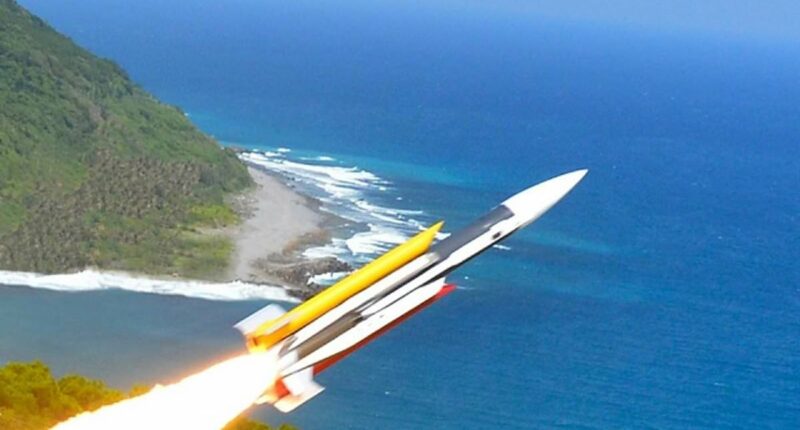Share this @internewscast.com
America could potentially lose thousands of soldiers, along with hundreds of aircraft, submarines, and numerous ships including aircraft carriers if China initiates a blockade of Taiwan.
A chilling new series of war games showed how the United States would be drawn into the dispute and losses could quickly escalate.
The warning comes as Taiwan compared Xi Jinping to Hitler and claimed he thinks about ‘conquering’ their country every day.
Meanwhile, Xi welcomed Russia’s Vladimir Putin and Indian Prime Minister Narendra Modi for talks in Beijing on Monday.
Xi, Putin, and North Korea’s Kim Jong Un are set to attend a massive military parade in the Chinese capital on Wednesday.
U.S. intelligence believes a first step toward taking over Taiwan may be a Chinese naval blockade and it could happen within two years.
China is currently building three warships for every one the U.S. is producing.
Instead of launching a direct invasion, a blockade could force Taiwan to surrender, leading to a frantic effort to evacuate a million foreign nationals trapped on the island.
In such a crisis, President Donald Trump would face the colossal decision of whether to break the blockade using military force with convoys or to let Taiwan endure the consequences.
He would also have to consider a dangerous ongoing airlift – like the allies did for Berlin in the aftermath of World War II.

Donald Trump squares up to Xi Jinping amid fears of a Chinese invasion of Taiwan

A test launch of a Hsiung Feng II anti-ship cruise missile from southern Taiwan as the country faces the possibility of a Chinese naval blockade
A total of 26 war games scenarios were played out by the Center for Strategic and International Studies (CSIS) think tank.
In a dire situation, overcoming the blockade might cost the U.S. 21,000 casualties, 45 ships, an aircraft carrier, two submarines, and over 1,000 aircraft.
China suffered 13,000 casualties and lost 42 submarines, nearly 100 ships and around 1,000 aircraft.
‘Even successful missions result in significant casualties,’ the report indicated. ‘Such a conflict would be startling for the United States, which, since the end of the Cold War, has gotten used to low-casualty conflicts with minimal losses of major military assets.’
‘Blockades inherently increase tensions that are hard to control. Most scenarios result in casualties. Even with minimal escalation, the number of casualties would reach into the thousands.
‘At higher escalation levels, the United States lost hundreds of aircraft and dozens of warships.’

A Chinese warship launches an anti-ship missile during a military exercise

A Chinese fighter jet pilot from the Eastern Theater Command of the Chinese People’s Liberation Army (PLA) takes part in combat readiness patrol and military exercises around the Taiwan
China’s losses were also high and were often worse than those of the U.S..
The report, called ‘Lights Out?’ added: ‘Total victory is unachievable when both sides have a secure homeland and nuclear weapons.’
In the last five years China has surged its production of nuclear weapons, tripling its number of warheads to around 600.
Earlier this year, President Trump warned that ‘within five or six years they’ll be even’ with the U.S., which has thousands of nuclear weapons.
China claims Taiwan as its territory and has never renounced the use of force to seize it.
According to U.S. intelligence, President Xi has instructed his generals to be ready for a potential order to invade Taiwan from the year 2027.
The U.S. has maintained a stance of ‘strategic ambiguity,’ which means it is not obligated to defend the island.
But the Taiwan Relations Act states that ‘any effort to determine the future of Taiwan by other than peaceful means’ is ‘of grave concern’ to the U.S.
Strong forces within the Pentagon argue that failure to protect Taiwan would be catastrophic for U.S. standing in the world, and would leave China to dominate Asia.

U.S. submarines could help break a Chinese blockade of Taiwan

A U.S. submarine test fires a ballistic missile
Defense Secretary Pete Hegseth has been clear that a possible invasion is ‘imminent.’
He has said there is ‘no need to sugarcoat it’ and a Chinese invasion would have ‘devastating consequences’ for the world.
The ‘denial of a Chinese fait accompli seizure of Taiwan’ is his top priority.
U.S strategists believe a blockade may be China’s first step to weaken Taiwan economically, and prevent American humanitarian and military support getting through.
For the last three years the People’s Liberation Army has been simulating such blockades, launching drills in which Chinese ships practice surrounding Taiwan.
That included a major exercise called Strait Thunder-2025A in April.
Under international law a blockade would be considered an act of war.

A map shows how China’s People’s Liberation Army (PLA) has been conducting drills in the waters around Taiwan

Xi Jinping says Taiwan is part of China
The CSIS war gamers’ conclusion was that America must prepare now to launch convoys to supply Taiwan because.it has lost expertise on how to do it.
‘The U.S. Navy is out of practice because convoys have not been a priority mission since the end of the Cold War,’ the report said..
It should also ‘make contingency plans’ for an airlift and military resupply of Taiwan.
‘The president might not execute an airlift or military resupply because of its high cost, political risks, and low deliveries, but (the Pentagon) would be derelict in its duties if it did not have plans in place,’ the report said.
Another conclusion was that the U.S. would not be able to conduct a Ukraine-style operation, resupplying Taiwan with arms while not getting directly involved.
‘A “Ukraine strategy” was attractive but insufficient when applied to Taiwan because Taiwan’s needs are too great and, in most scenarios, China’s blockade was too tight,’ the report said.
‘If China escalated to using military force, the United States had to accept a Taiwanese capitulation on China’s terms or become directly involved in the conflict.
‘With U.S. intervention, in most scenarios, convoys kept Taiwan supplied, but often at a huge cost.’

China’s People’s Liberation Army (PLA) conducts missile tests

A Chinese 6th Generation jet fighter prototype
According to the war games a blockade would see Taiwan running out of natural gas after 10 days, coal in seven weeks, and oil in 20 weeks.
‘In most scenarios, Taiwan cannot face China alone,’ the report concluded. ‘Taiwan needs U.S. assistance, likely in direct combat operations, if it is to remain autonomous and democratic.
The report added that the Pentagon preparing how to operate convoys now was essential.
‘It must act swiftly once the president directs action,’ the report said.
‘The experience in World War II is a warning. The Navy was slow to adopt convoys, generating heavy costs as U-boats sank 240 cargo ships on the eastern seaboard from January to June 1942.’

















